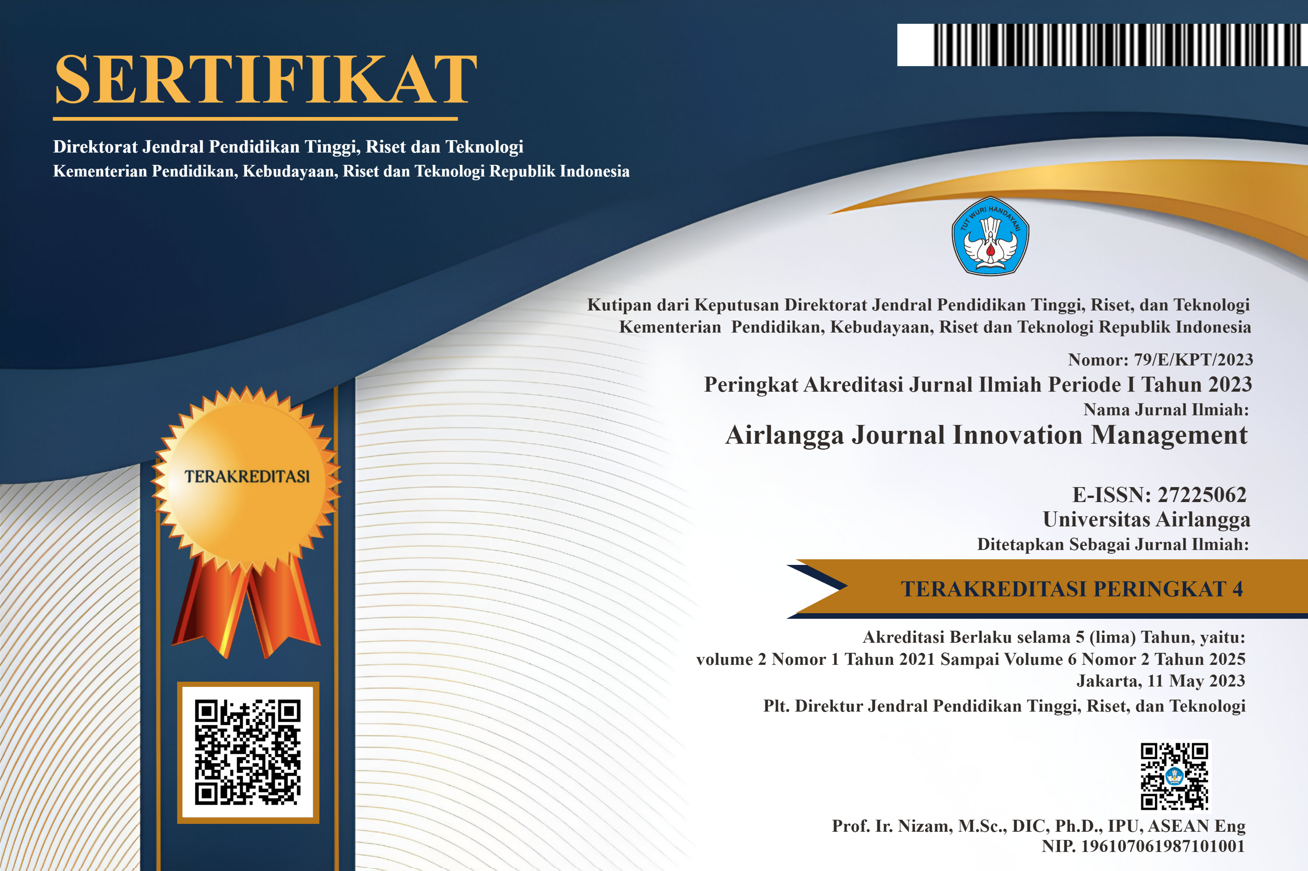Determinants of Consumer Purchase Intentions on Halal Products
Unduhan
Tingginya peminat produk halal di Indonesia dalam bidang makanan dan minuman,hal menimbulkan tantangan dan peluang bagi MUI sebagai pihak yang berwenang dalam mengeluarkan sertifikasi halal dan pelaku usaha sebagai mata rantai pertama dalam pendistribusian produk ke konsumen. Hal tersebut menjadi sebuah perhatian khusus bagi UMKM cafetelo D-9 dalam menghdapi tantangan dan peluang dari permintaan akan produk yang terferifikasi halal. Oleh karena itu, penelitian ini bertujuan untuk mengukur pengetahuan konsumen terhadap sikap dan niat beli dari produk D-9 Salatiga. Pengumpulan data dilakukan dengan simple random sampling yang dibagikan melalui media sosial. Pengolahan data menggunakan metode Structural Equation Model-Partial Least Square (SEM-PLS) dengan software SmartPLS 3.0. Hasil penelitian ini menyimpulkan pengetahuan halal konsumen terhadap niat beli berpengaruh signifikan serta positip Pengetahuan halal berpengaruh signifikan terhadap sikap serta sikap berpengaruh signifikan terhadap niat beli konsumen. Penelitian ini diharapkan memberikan manfaat terhdap pihak UMKM selaku palaku bisnis untuk bisa lemih memberikan perhatian bagi sertifikasi halal mengingat antusias serta respon positif masyarakat akan produk makanan dan minuman halal
Abd Rahman, A., Asrarhaghighi, E., & Ab Rahman, S. (2015). Consumers and halal cosmetic products: Knowledge, religiosity, attitude and intention. Journal of Islamic Marketing, 6(1), 148–163. https://doi.org/10.1108/JIMA-09-2013-0068
Ahmad, A. N., Rahman, A. A., & Rahman, S. A. (2015). Assessing knowledge and religiosity on consumer behavior towards halal food and cosmetic products. International Journal of Social Science and Humanity, 5(1), 10–14. https://doi.org/10.7763/ijssh.2015.v5.413
Ajzen, I. (1991). The theory of planned behavior. Organizational Behavior and Human Decision Processes, 50(2), 179-211. doi:10.1016/0749-5978(91)90020
Ajzen, (2002). Perceived behavioural control, self-efficacy, locus of control and the theory of planned behaviour. Journal ofApplied Social Psychology, 32(4), 665-683
Alam, S. S., & Sayuti, N. M. (2011). Applying the theory of planned behavior (TPB) in halal food purchasing. International Journal of Commerce and Management, 21(1), 8-20. doi:10.1108/10569211111111676
Aqdas, R., & Amin, A. (2020). Islamic perspective in consumer behaviour: Effect of halal awareness and halal logo with mediating role of purchase intention. Hamdard Islamicus, 43(2), 89–107.
Assael, H. (2001). Consumer Behavior and Marketing Action. 6th ed. Natorp Blvd,Mason: South-Western College Publishing.
Fitriyani, E. N. (2021). Pengaruh Kesadaran Halal, Islamic Branding, dan Sikap Terhadap Minat beli Generasi Z dimoderasi Social Media Influencer. Frontiers in Neuroscience, 14(1), 1–13.
Hair, J. F., Hult, G. T. M., Ringle, C. M., & Sarstedt, M. (2017). A Primer On Partial Least Squares Structural Equation Modeling (PLS-SEM) (G. Dickens (ed.); Second Edi). Sage Publication.
Haque, A., Sarwar, A., Yasmin, F., Tarofder, A.K. and Hossain, M.A. (2015), "Non-muslim consumers' perception toward purchasing halal food products in malaysia”, Journal of Islamic Marketing, Vol. 6 No. 1, doi: 10.1108/JIMA-04-2014-0033.
Indriantoro, N., & Supomo, B. (2002). Metodologi penelitian bisnis untuk akuntansi dan manajemen.
Juniwati, & Maghribi, R. (2022). The Effect Of Halal Awareness and Perceived Quality On The Decision To Purchase Snacks with Brand Image as a Mediation Variable. Jurnal Ekonomi Bisnis Dan Kewirausahaan (JEBIK) 2022, 11(1), 116–130. http://dx.doi.org/10.26418/jebik.v11i1.51179
Mahardika, T. (2019). Pengaruh Pengetahuan dan Religiusitas Terhadap Minat Beli Dengan Sikap Konsumen Sebagai variabel Mediasi (Studi pada Pengguna Kosmetik Wardah di Yogyakarta). Jurnal Ilmu Manajemen. https://journal.uny.ac.id/index.php/jim/article/view/34766
Notoatmodjo, S. (2003). Metodelogi Penelitian Kesehatan. Jakarta: Rineka Cipta
Kemenperin: Industri Makanan Dan Minuman Masih Jadi Andalan. (2017). Retrieved February 10, 2023, from https://kemenperin.go.id/artikel/18465/Industri-Makanan-dan-Minuman-Masih-Jadi-Andalan
Kotler, P., & Keller, K. L. (2009). Menejemen Pemasaran. Penerbit: Erlanggga. Jakarta.
Kotler, P., & Lee, N. (2008). Social marketing: Influencing behaviors for good. Sage.
Pradana, M., Huertas-García, R., & Marimon, F. (2020). Spanish muslims' halal food purchase intention. International Food and Agribusiness Management Review, 23(2), 189–202. https://doi.org/10.22434/IFAMR2019.0200
Pudjawidjana. (1983). Perencanaan Pembelajaran. Bandung : Bumi Aksara
Sarwono, J., & Umi, N. (2015). Membuat Skripsi, Tesis dan Disertasi dengan Partial Least Square SEM (PLS-SEM). Andi Publisher.
Sekarwangi, N., & Hendayani, R. (2022). Pengaruh Kesadaran Pada Produk Kosmetik Halal Terhadap Minat Beli Yang Dimediasi Oleh Sikap Mahasiswa Di Kota Bandung Mengenai Label Halal Dan Dimoderasi Oleh Keterlibatan Agama. eProceedings of Management. 9(5), 2892–2899.
Setyaningsih, E. D., & Marwansyah, S. (2019). The Effect of Halal Certification and Halal Awareness through Interest in Decisions on Buying Halal Food Products. Syi`ar Iqtishadi: Journal of Islamic Economics, Finance and Banking, 3(1), 65. https://doi.org/10.35448/jiec.v3i1.5515
Wibowo, S. E., Ruswanti, E., & Januarko, U. (2013). Pengaruh Persepsi Kualitas Pelayanan Terhadap Niat Pembelian Ulang Pada Toko Buku Gramedia Yogyakarta. Jurnal Ekonomi, 4(1): 56-64
Widyanto, H. A., & Sitohang, I. A. T. (2021). Muslim millennial's purchase intention of halal-certified cosmetics and pharmaceutical products: the mediating effect of attitude. Journal of Islamic Marketing. https://doi.org/10.1108/JIMA-04-2020-0117
Hak Cipta (c) 2023 Airlangga Journal of Innovation Management

Artikel ini berlisensiCreative Commons Attribution-NonCommercial-ShareAlike 4.0 International License.
- The journal allows authors to hold copyright without restrictions and retain publication rights without restrictions. The author retains the copyright and grants the first publication rights to the journal, with his work simultaneously licensed under the Creative Commons Attribution-NonCommercial-ShareAlike 4.0 International License (CC BY-NC-SA). This license allows others to share the work with acknowledgment of authorship and initial publication in this journal, provided that the work is not used for commercial purposes and that any derivative works must use the same license.
- Authors may enter into additional contractual agreements for non-exclusive distribution of the journal publication version (e.g., uploading it to an institutional repository or publishing it in book form), while still including acknowledgment of the initial publication in this journal.
- Authors are allowed and encouraged to upload their work online (e.g., in an institutional repository or personal website) before and during the submission process. This can support productive scientific exchanges as well as increase citations to published works.

AJIM by UNAIR is licensed under a Creative Commons Attribution-NonCommercial-ShareAlike 4.0 International License.





















